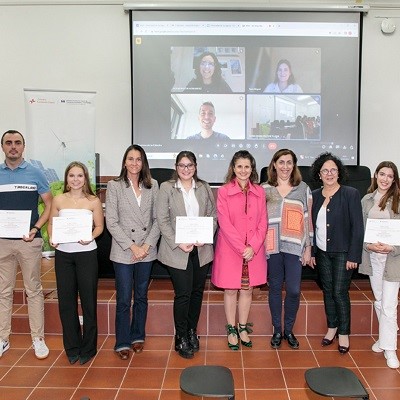- This year's event received a total of 30 applications
- The awarded projects works are aligned with the objectives of this Chair of Ecological Transition and Innovation
The first prize of the Final Bachelor's Thesis went to Jorge Veiras, an undergraduate student in Physics, who presented the paper 'From space to the sea: evaluating the capacity of satellite data to map benthic habitats using machine learning algorithms'; while the second prize went to Noemí Martín, an undergraduate student in Chemistry, for 'Free noble metal catalysts to produce hydrogen'. Third place in this category went to Agustina Escariz, an undergraduate student in early childhood education, for her paper 'Bringing the SDGs to the Early Childhood Education Classroom'.
For the Master's thesis, first place went to Jennifer Rodriguez, a Master's student in Chemistry, for her study 'Nickel chalcogenides supported on nickel foams as catalysts for the green hydrogen production reaction'. Second place was taken by Sara Miquel, a Master's student in renewable energies, for her project on 'Disambiguation of wind direction in doppler lidar systems', while third place was not awarded.
The award ceremony, which took place in the Graduation Hall of the Chemistry Department of the College of Sciences of the University of La Laguna, was attended by the Vice Rector for Culture and University Extension, Isabel León; the Director of the Cepsa Research Center, Joana Frontela, a member of the technical committee that decided on the awards; the Director of the Chair, Elena Pastor; and the head of Fundación Cepsa in the Canary Islands, Belén Machado.
Vice Chancellor Isabel León expressed her satisfaction that these awards recognize the achievements and contribution of the university community. These awards "show the capacity of young researchers to solve problems that affect us all and to overcome, with high resilience, obstacles of various kinds, optimizing economic, human and time resources to contribute to a better planet." She added that "awards such as these help to make visible and recognize people who ask questions and want to contribute to the benefit of society as a whole, through their work and dedication to research".
After congratulating the winners, Joana Frontela, who was accompanied at the ceremony by Mariam Romero and Begoña Lamothe, respectively in charge of Fundamental Chemistry and Advanced Analysis at the Cepsa Research Center, stressed that "the award-winning projects are aligned with the objectives of the Chair, addressing some of the greatest challenges of our era such as decarbonization and CO2 capture, the fight against climate change and technological innovation." She also remarked that "they are a small sample of the high scientific and technical quality of all the participants", and that "it has been a highly competitive event."
Belén Machado wanted to highlight the high quality of the 30 projects presented, recalling that these awards value the acquisition of skills and the initial contact with research. She predicted a prosperous professional future for the five winners thanks to "research that is undoubtedly focused on contributing to the advancement of society," remarking that in its four editions these awards have promoted education and research activity, as well as innovation and the dissemination of results, while also arousing interest in carrying out future academic projects, both among the winners and the rest of the student body.
For her part, Elena Pastor stressed that research excellence should be recognized and rewarded, and congratulated the winners while thanking the members of the selection committee, the students, and their mentors for their work.
Selected topics
The study by Jorge Veiras, winner of the first place in the Bachelor's Thesis award, 'From space to the sea: evaluating the capacity of satellite data to map benthic habitats using machine learning algorithms,' addressed the role played by sebadal seagrass meadows in the Canary Islands as one of their best assets for a cleaner and greener future, with an important role in the fight against climate change by acting as carbon sinks, in addition to the need to monitor and conserve them.
'Free noble metal catalysts to produce hydrogen' is the title of the Bachelor's Thesis of Noemí Martín, winner of the second place in the Bachelor's Thesis category, which addresses the production of hydrogen, considered an alternative energy resource to fossil fuels, from the electrolysis of water by using renewable energies, employing materials that accelerate the reactions involved in this process more economically than platinum or palladium.
Bringing the SDGs to the Early Childhood Education classroom' is the project that led Agustina Escariz to address the Sustainable Development Goals (SDGs) and the 2030 Agenda in a way adapted for children, with interactive and innovative stories. This is based on the premise that if they are made aware from an early age in a way that is understandable to them, they will grow up caring for the planet, reducing polluting waste, improving energy efficiency, and fighting climate change.
Regarding the awards for the best Master's Thesis, Jennifer Rodriguez, who took first prize for 'Nickel chalcogenides supported on nickel foams as catalysts for the green hydrogen production reaction,' presents a study that promotes the production of high-performance, cost-effective and environmentally friendly electrocatalysts, capable of competing with the use of noble metals.
The winner of second place in this category, Sara Miquel, analyzed in her project 'Disambiguation of wind direction in doppler lidar systems the offshore wind technology based on Floating Lidar Systems to achieve, by improving the accuracy of wind measurements, the optimal operation of wind turbines and the efficiency of wind farms.

